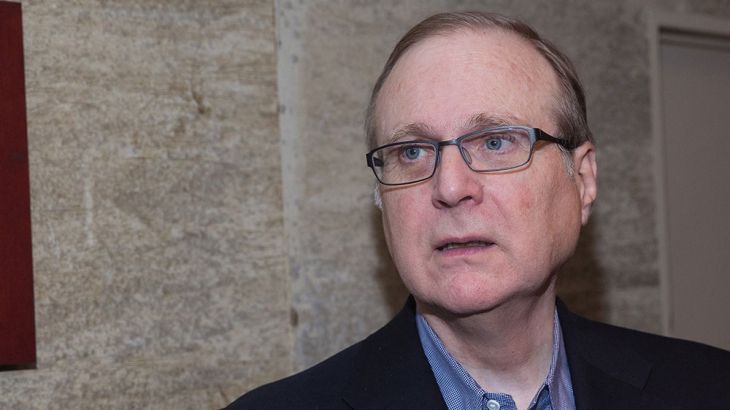Microsoft cofounder Paul Allen dies at age 65
Billionaire dies after his latest battle with cancer, his family said on Monday.

Billionaire Paul Allen, who founded US software giant Microsoft with Bill Gates in the 1970s, died on Monday at the age of 65 after his latest battle with cancer, his family said.
Allen said earlier this month he was being treated for non-Hodgkin’s lymphoma, the same kind of cancer he battled and overcame nearly a decade ago. He was first diagnosed when he was CEO of Microsoft.
Keep reading
list of 4 itemsHong Kong’s first monkey virus case – what do we know about the B virus?
Why will low birthrate in Europe trigger ‘Staggering social change’?
The Max Planck Society must end its unconditional support for Israel
Allen was the man who persuaded school-friend Bill Gates to drop out of Harvard to start what became the world’s biggest software company.
Allen left Microsoft in 1983 – before the company became a corporate juggernaut – following a dispute with Gates, but his share of their original partnership allowed him to spend the rest of his life and billions of dollars on yachts, art, rock music, sports teams, brain research and real estate.
“My brother was a remarkable individual on every level. While most knew Paul Allen as a technologist and philanthropist, for us he was a much-loved brother and uncle, and an exceptional friend,” Allen’s sister Jody said in a statement.
“Paul’s family and friends were blessed to experience his wit, warmth, his generosity and deep concern … At this time of loss and grief for us – and so many others – we are profoundly grateful for the care and concern he demonstrated every day.”
‘Indispensable’
In early October, Allen revealed he was being treated for the non-Hodgkin’s lymphoma, which he also was treated for in 2009. He had an earlier brush with Hodgkin’s lymphoma, another cancer, in the early 1980s before leaving Microsoft.
Satya Nadella, current Microsoft CEO, said in a statement on Linkedin, that Allen’s “contributions to our company, our industry and to our community are indispensable”.
Nadella added Allen “created magical products, experiences and institutions and in doing so, he changed the world”.
A music-lover, Allen had a list of high-profile friends in the entertainment business, including U2 singer Bono, but preferred to avoid the limelight at his compound on Mercer Island, across Lake Washington from Seattle, where he grew up.
Allen, also a well-known philanthropist, is one of the world’s wealthiest people. In October, Forbes magazine estimated his wealth at $21.7bn, ranking 44th on Forbes’s list of the world’s billionaires.
He owned or was part owner of a number of sports clubs including the NFL’s Seattle Seahawks and NBA’s Portland Trail Blazers.
‘Idea man’
Paul Gardner Allen was born in Seattle on January 21, 1953, the son of a librarian father and teacher mother. He was two years older than Gates, but when they met in the computer room at the exclusive Lakeside School in Seattle in 1968, they discovered a shared passion.
“In those days we were just goofing around, or so we thought,” Gates recalled in his 1985 book The Road Ahead.
|
|
Allen went on to Washington State University but dropped out in 1974 to take a job with Honeywell in Boston. While there, he pestered Gates, who was studying at nearby Harvard, to quit school and join the nascent revolution in personal computing.
Gates finally agreed and in 1975 the two jointly developed BASIC software for the Altair 8800, a clunky desktop computer that cost $400 in kit form.
The pair moved to Albuquerque, New Mexico, close to the Altair’s maker, and formed a company. It was Allen’s idea to call it Micro-Soft, an amalgam of microcomputer and software. The hyphen was later dropped.
Allen was in charge of Microsoft’s technical operations for the company’s first eight years, making him one of the handful of people who created early software such as MS-DOS and Word that enabled the PC revolution and thrust Microsoft to the top.
But he had ceased to be on the cutting edge of software development by the early 1980s. He never displayed the commercial instinct of Gates, who generally is credited with powering Microsoft’s rise to ubiquity in the 1990s.
Falling out
Allen left Microsoft in 1983 after falling out with Gates and his new lieutenant, Steve Ballmer, in December 1982, only months after being diagnosed with Hodgkin’s lymphoma. As he recalled in his 2011 memoir, Idea Man, he overheard Gates and Ballmer secretly plotting to reduce his ownership stake.
“They were bemoaning my recent lack of production and discussing how they might dilute my Microsoft equity by issuing options to themselves and other shareholders,” Allen wrote.
Gates and Ballmer later apologized but the damage was done and Allen left Microsoft, although he remained on the board until 2000.
Allen liked to cast himself as a technology visionary who drove Microsoft’s early success and saw the future of connected computing long before the internet.
“I expect the personal computer to become the kind of thing that people carry with them, a companion that takes notes, does accounting, gives reminders, handles a thousand personal tasks,” Allen wrote in a column in Personal Computing magazine as far back as 1977, long before portable computers became a reality.